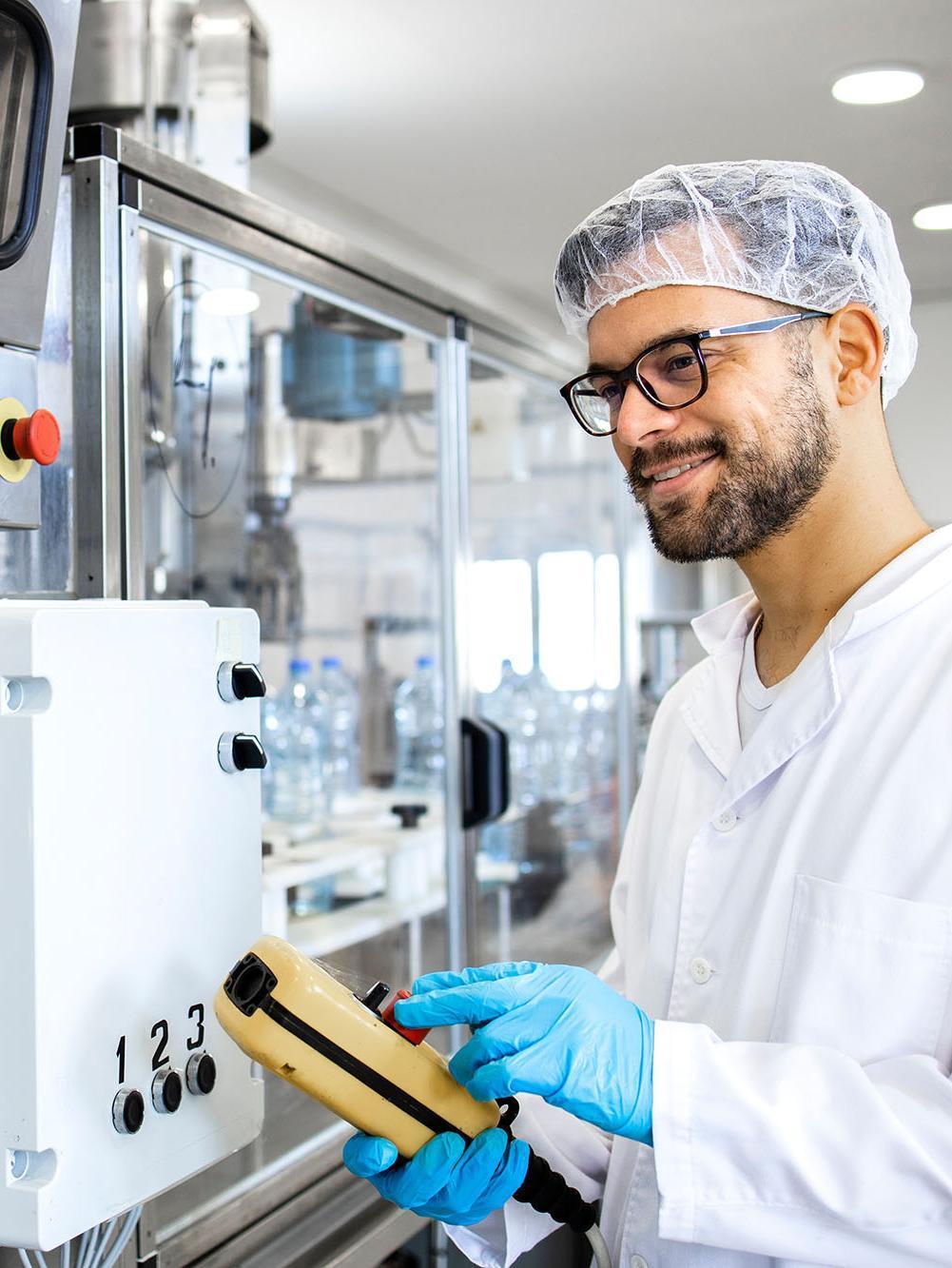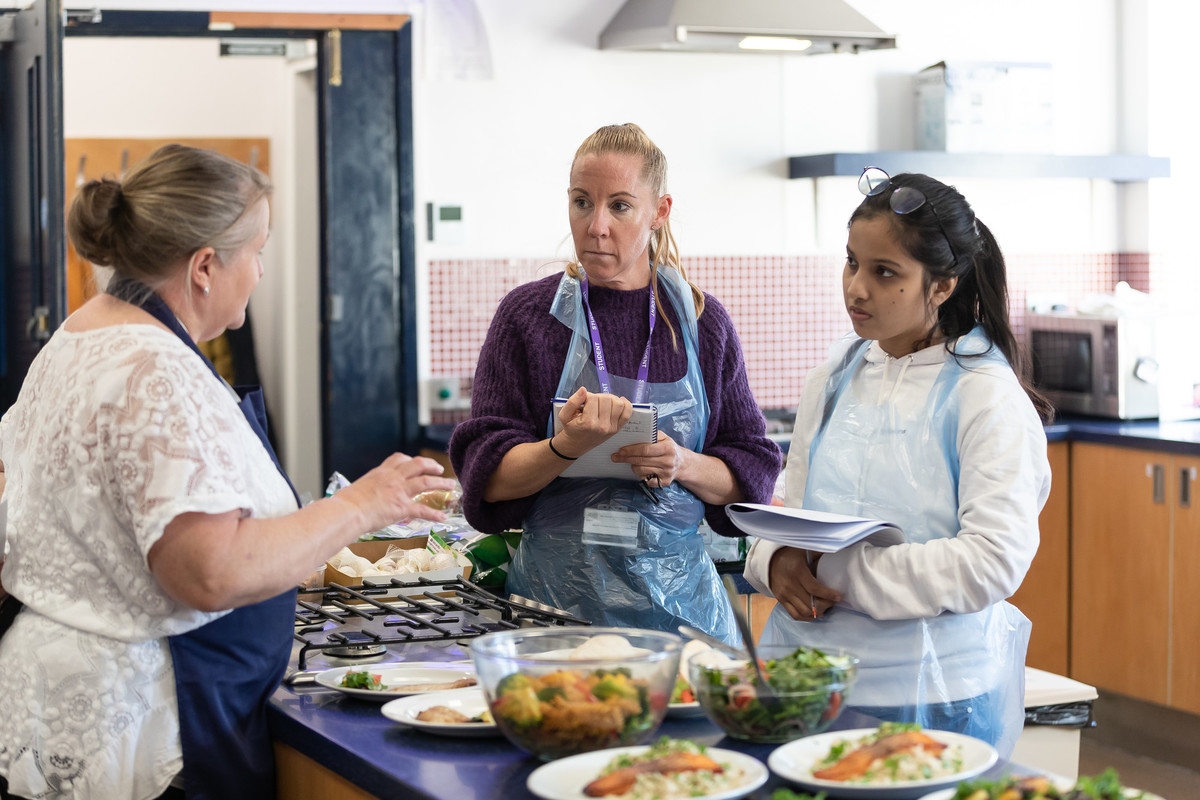Food Science and Innovation MSc


This course aims to develop your skills and knowledge and combine food science, technology and nutrition to meet the industry's challenges.
Population growth, both globally and within the UK, continues to put pressure on all elements of the agri-food supply chain. A fully coordinated approach to food quality, safety, security and sustainability is needed. You will use your specialist skills, combining food science and technology, as well as nutrition and health, to meet the industry's challenges; the objective of the course is to create innovative food products while ensuring they are safe, wholesome and nutritious.
Our MSc in Food Science and Innovation integrates the key elements required to address the future needs of industry and the global population. The course will benefit individuals looking to enhance their careers in the food supply chain. It is also ideal for those interested in new product development, food processing and manufacturing, and the food service industries.
What You’ll Study
This MSc course is built upon a programme of research and development that has been established at the University to support the food and drink sectors. The course consists of the following 20 credit modules leading to a dissertation.
Module content:
This module will cover key areas in Functional Foods & Bioactive Ingredients and will include the following:
- Novel bioactive ingredients and waste valorisation of high value products extracted from food waste streams
- Opportunities and exploitation of non-animal derived proteins
- Bioactive components for control of chronic disease conditions
- Legislation and regulation, including health claims and EFSA definitions
- Technologies for organoleptic property control and enhancement of ingredient bioavailability
Module aims:
The module will address opportunities presented by novel ingredients and foods for new product development. This will enable students to understand how manufacturers respond to expanding markets such as those based on restricted diets, for example halal, kosher, vegetarian, vegan ‘free from’ and ‘clean label’ foods. Novel functional ingredients such as emulsifiers derived from algae or vegetable co-products will be explored both theoretically and from a practical perspective.
The opportunity to meet societal challenges concerning health and wellness, especially to control or prevent chronic disease and obesity will be examined. The scope for foods based on novel functional or bioactive ingredients and targeted at population groups with specific needs such as the elderly will also be highlighted.
The use of novel bioactive and functional materials will be examined practically by the preparation of food materials and subsequent performance testing. Practical experience will be gained by development of novel emulsifiers for use as alternative ingredients in food products.
Module content:
The module content is designed to introduce key concepts relating to packaging in the food industries with a focus on new developments. The following points will be addressed:
- Active packaging and smart labels for enhanced traceability, supply chain monitoring, consumer protection and preservation of food.
- Sustainable or biodegradable packaging products
- Nanocomposite technologies for enhanced barrier properties of packaging films and extension of shelf-life
- Active packaging systems and protective functions derived from antimicrobials, preservatives and atmosphere modification
- Packaging associated risks - plasticisers and nanoparticles
- Retail marketing and consumer perceptions of nanotechnology
Module aims:
The module aims to develop the student's understanding of new developments in packaging technologies.
Packaging is essential to enable effective distribution and preservation of food and to facilitate end-use convenience to the consumer. Currently worth 2% of global GDP, there is an emerging need for new and efficient ways to economise on business processes, ameliorate safety and quality issues through the supply chain and reduce losses and waste in the food industry and by domestic users.
Demonstrations of innovative packaging technology will be included in the module.
Module content:
The research will be agreed with an appropriate supervisor and the Research Co-ordinator. The subject matter must be related to the field of food science.
Module aims:
1. To provide the student with an opportunity to investigate systematically and in depth a topic of direct relevance to the programme of study and his/her personal interests.
2. To enable the student to draw on and contribute to the development of the growing body of knowledge in the field of nutrition.
3. To require the student to present a research proposal in the form of a poster and oral presentation.
4. To require the student to present the outcomes of personal research in the form of a substantive research article.
Module content:
The module will cover key areas relating to the rheological, textural and sensory analysis of foods including some or all of the following:
- Food structuring and properties - the role of food additives and ingredients on the physicochemical properties, stability and shelf life of food.
- Viscometry and rheometry - theory and practice with reference to evaluation of food materials.
- The texture of food and its evaluation - theoretical and practical approaches.
- Introduction to the sensory properties of foods.
- Sensory analysis study design and evaluation of consumer perceptions of food products.
- Applications of techniques to new product design.
Module aims:
The module aims to introduce the student to some of the key theoretical and practical approaches to the evaluation of the physical properties and performance of food, as well as the use of sensory science to evaluate the acceptability of new products. The role of food ingredients and additives on these properties, to ensure quality assurance and control, as well as consumer acceptance will be explored. The opportunities to make use of these techniques and strategies to develop new food products for existing and new consumer groups (e.g. the elderly) will be examined. The methods necessary for the collection and evaluation of data generated by these techniques will be addressed, including ethical considerations.
Module content:
The module content is designed to introduce key concepts relating to the security and integrity of the food supply chain. The strategies, procedures and technologies that have been introduced or might have a role in future will be explored
Some or all of the following areas will be addressed by the module:
- The nature of the modern food supply chain, demand forecasting and the role of the consumer
- Human population and demographic change - changing pressures on the food supply chain.
- Origins, fate, behaviour and impact of contaminants and allergens in the food supply chain
- Food production, processing and waste - new technologies for enhanced efficiency and waste reduction.
- Waste valorisation and alternative sources of protein.
- Adulteration, fraud and threat assessment.
- Supply chain and demand forecasting in food and drink industries.
- Nanotechnology applications for rapid diagnostics and enhanced packaging.
- Legislation and enforcement for consumer protection.
Module aims:
The module aims to introduce the student to some of the key issues that currently influence the availability of food, as well as those which are expected to impact on this in the future. These include factors such as population growth, demographic and social change, resource depletion and environmental degradation. The operation of the various components of the food supply chain that link environment and primary production to the end consumer will also be examined, as well as the opportunities to modify or change behaviour and practice. In addition to ensuring sufficient quantities of food are made available for the consumer, it is also essential to protect the food supply chain from events or activities that might impact upon quality and safety. The origins and occurrence of contaminants, allergens and adulterants in the food supply chain will be explored, as well as the strategies and procedures necessary to ensure the supply of safe, nutritious and wholesome food to the consumer.
Module content:
1. The nature of scientific research: Types of research (analytical, descriptive, experimental, quantitative and qualitative), scientific language (hypothesis, concepts, operational definitions, dependent/independent variables), sampling procedures, measurement issues (reliability and validity).
2. Research and data collection methods: Experimental research (developing hypotheses, independent/dependent variables, controls, sample selection, study designs, and experimental validity); descriptive research (questionnaires and interviews, case studies); qualitative research (characteristics, procedures, methods of data collection, data analysis, and internal/external validity).
3. Relevant methods of research to Food Science.
4. The nature of research; scientific methods of enquiry, pure versus applied ways of problem solving. Developing the research problem; identifying a topic area, devising specific questions, discovering what is already known (reviewing the literature), identifying gaps in knowledge, determining feasible ways to answer the questions.
5. Ethics in research.
6. Introduction to data analysis software (SPSS for Windows). Establishing an SPSS database. Defining and transforming variables; data storage and retrieval.
7. Data analysis for descriptive and experimental research; Descriptive statistics. Describing data; measures of variability, correlation and scatter plots. Inferential statistics. Selecting an appropriate statistical test (parametric or non-parametric), and types of statistical tests (chi-square; t-tests; one-way ANOVA & post-hoc tests; Wilcoxon, Mann-Whitney U). Worked examples in SPSS.
8. Additional statistics; Repeated Measures ANOVA; Factorial ANOVA, Limits of agreement analysis for method comparison and test retest reliability. Worked examples in SPSS.
Module aims:
1. To expose students to the essential elements in the process of conducting sound scientific research.
2. To develop students’ skills in the key aspects of data handling and statistical analysis.
Module content:
- Drivers of change and innovation in the food industry and understanding consumer demands
- Emerging and future trends in food processing, food ingredients, resource availability, waste minimisation and, sustainability.
- Open Innovation: Drivers of reduction in salt; sugar and fats
- The innovative process including corporate environments. Protection of intellectual property, rights, patents, trade secrets, trademarks and licensing.
- Case studies of recent innovations in free from, clean label and natural foods and novel protein sources and their practical exploitation.
- Definitions and basic concepts of nanoscale materials and nanotechnologies
- Regulatory aspects of nanotechnology in food and related applications
- Nanotechnologies in food processing
- Introduction to novel food application of hydrocolloids
Module aims:
The aims of the module are to:
- Develop an understanding of the drivers of innovation in food science and technology and recent strategies that have been pursued by the food industry.
- Develop an understanding of the tools and techniques to develop and protect innovation in the food industry.
- Update the innovative food processing, food formulation and ingredients.
- Introduce some of the key theoretical and practical approaches to the evaluation of performance of food.
- Provide the opportunities to make use of knowledge and techniques to develop new food products.
- Practise the methods necessary for the collection and evaluation of data generated by these techniques.

How we teach at the University of Chester
The MSc Food Science and Innovation course is delivered in person, primarily through seminars, lectures and workshops. You will also have the opportunity to take part in practical laboratory sessions. You will experience an interactive and collaborative learning environment, often working alongside your peers and with staff to develop the key competencies.
The course consists of a series of taught modules, each delivered in a three or four-day block, followed by a period of directed learning and the submission of an assessment as set out in each module. This is designed to help you balance your studies with personal and work commitments.
We use a variety of teaching and learning modes, such as lectures, seminars, group activities, case studies, student presentations, laboratory classes and practical activities. Independent learning following the taught element is a key feature of the course, and is supported through individual tutorials (in person or online) and assessment workshops.
Teaching is delivered by experienced, well-published academics and practitioners, who offer diverse perspectives and use a range of materials and teaching methods to ensure your individual learning needs are met.
The range of assessment methods on the course represents the different types of tasks you are likely to encounter in the workplace. These include assessments in the form of practical lab assessments, lab reports, written work (both long and short form, e.g., reports and reflections), portfolios and presentations. Assessments are also integrated into the learning process, enabling consistent application of knowledge. Course staff regularly review assessment methods to ensure they are relevant and reflect real-world expectations in the context of postgraduate level employment.
Your Future Career
Careers Service
The University has an award-winning Careers and Employability service which provides a variety of employability-enhancing experiences; through the curriculum, through employer contact, tailored group sessions, individual information, advice and guidance.
Careers and Employability aims to deliver a service which is inclusive, impartial, welcoming, informed and tailored to your personal goals and aspirations, to enable you to develop as an individual and contribute to the business and community in which you will live and work.
We are here to help you plan your future, make the most of your time at University and to enhance your employability. We provide access to part-time jobs, extra-curricular employability-enhancing workshops and offer practical one-to-one help with career planning, including help with CVs, applications and mock interviews. We also deliver group sessions on career planning within each course and we have a wide range of extensive information covering graduate jobs .
Entry Requirements
2:1 honours degree
Applicants should have a 2:1 honours degree (or a 2:2 with two to three years industry experience) in any of the following: Food Science and Technology; Biotechnology, Biochemistry; Nutrition; Biology (with a strong Biochemistry component) or related subjects.
2:1 honours degree
Applicants should have a 2:1 honours degree (or a 2:2 with two to three years industry experience) in any of the following: Food Science and Technology; Biotechnology, Biochemistry; Nutrition; Biology (with a strong Biochemistry component) or related subjects.
English Language Requirements
For more information on our English Language requirements, please visit International Entry Requirements.
Fees and Funding
£9,090for a full-time course (2026/27)
Guides to the fees for students who wish to commence postgraduate courses are available to view on our Postgraduate Taught Programmes Fees page. Here you will also find information about part-time fees and project/placement year fees.
£15,500for a full-time course (2026/27)
The tuition fees for international students studying Postgraduate programmes in 2026/27 are £15,500.
Please note: For MSc programmes where a placement or project year is undertaken there will be an additional charge of £2,900 for the placement/project year (due at the start of the second year of the course).
The University of Chester offers generous international and merit-based scholarships for postgraduate study, providing a significant reduction to the published headline tuition fee. You will automatically be considered for these scholarships when your application is reviewed, and any award given will be stated on your offer letter.
For more information, go to our International Fees, Scholarship and Finance section.
Irish Nationals living in the UK or ROI are treated as Home students for Tuition Fee Purposes.
Your course will involve additional costs not covered by your tuition fees. This may include books, printing, photocopying, educational stationery and related materials, specialist clothing, travel to placements, optional field trips and software. Compulsory field trips are covered by your tuition fees.
The University of Chester supports fair access for students who may need additional support through a range of bursaries and scholarships.
Full details, as well as terms and conditions for all bursaries and scholarships can be found on the Fees and Finance section of our website.




